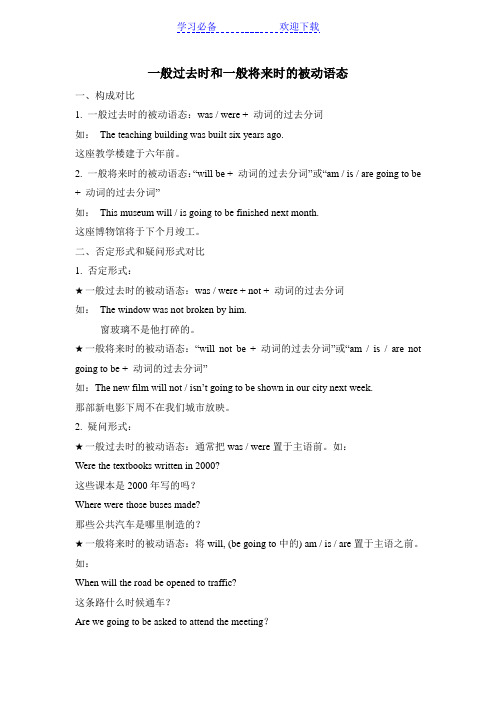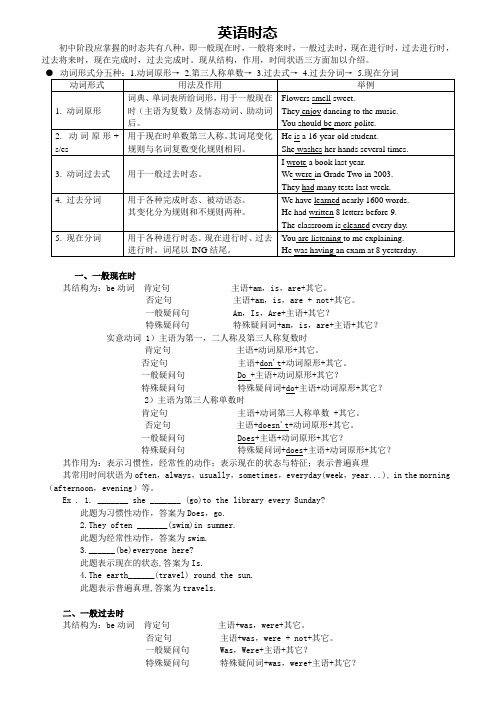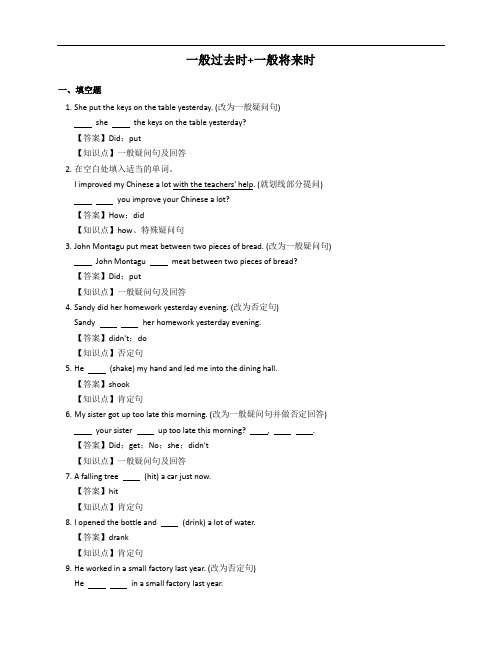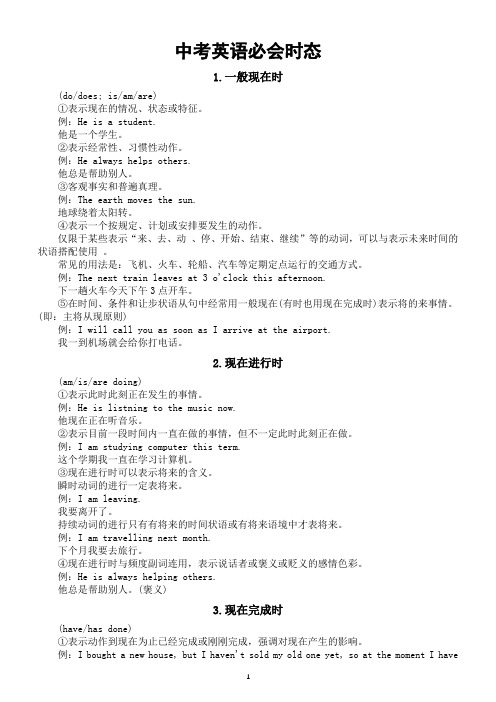初中英语一般将来时和一般过去时
一般过去时和一般将来时的被动语态

一般过去时和一般将来时的被动语态一、构成对比1. 一般过去时的被动语态:was / were + 动词的过去分词如:The teaching building was built six years ago.这座教学楼建于六年前。
2. 一般将来时的被动语态:“will be + 动词的过去分词”或“am / is / are going to be + 动词的过去分词”如:This museum will / is going to be finished next month.这座博物馆将于下个月竣工。
二、否定形式和疑问形式对比1. 否定形式:★一般过去时的被动语态:was / were + not + 动词的过去分词如:The window was not broken by him.窗玻璃不是他打碎的。
★一般将来时的被动语态:“will not be + 动词的过去分词”或“am / is / are not going to be + 动词的过去分词”如:The new film will not / isn’t going to be shown i n our city next week.那部新电影下周不在我们城市放映。
2. 疑问形式:★一般过去时的被动语态:通常把was / were置于主语前。
如:Were the textbooks written in 2000?这些课本是2000年写的吗?Where were those buses made?那些公共汽车是哪里制造的?★一般将来时的被动语态:将will, (be going to中的) am / is / are置于主语之前。
如:When will the road be opened to traffic?这条路什么时候通车?Are we going to be asked to attend the meeting?我们会被邀请参加会议吗?【趁热打铁】Ⅰ. 请选出能填入空白处的最佳选项。
(完整版)英语常用的八种时态

英语时态初中阶段应掌握的时态共有八种,即一般现在时,一般将来时,一般过去时,现在进行时,过去进行时,过去将来时,现在完成时,过去完成时。
现从结构,作用,时间状语三方面加以介绍。
一、一般现在时其结构为:be动词肯定句主语+am,is,are+其它。
否定句主语+am,is,are + not+其它。
一般疑问句 Am,Is,Are+主语+其它?特殊疑问句特殊疑问词+am,is,are+主语+其它?实意动词1)主语为第一,二人称及第三人称复数时肯定句主语+动词原形+其它。
否定句主语+don't+动词原形+其它。
一般疑问句 Do +主语+动词原形+其它?特殊疑问句特殊疑问词+do+主语+动词原形+其它?2)主语为第三人称单数时肯定句主语+动词第三人称单数 +其它。
否定句主语+doesn't+动词原形+其它。
一般疑问句 Does+主语+动词原形+其它?特殊疑问句特殊疑问词+does+主语+动词原形+其它?其作用为:表示习惯性,经常性的动作;表示现在的状态与特征;表示普遍真理其常用时间状语为often,always,usually,sometimes,everyday(week,year...), in the morning (afternoon,evening)等。
Ex . 1. _______ she _______ (go)to the library every Sunday?此题为习惯性动作,答案为Does,go.2.They often _______(swim)in summer.此题为经常性动作,答案为swim.3.______(be)everyone here?此题表示现在的状态,答案为Is.4.The earth______(travel) round the sun.此题表示普遍真理,答案为travels.二、一般过去时其结构为:be动词肯定句主语+was,were+其它。
一般将来时与一般过去时

(一)一般将来时一般将来时表示将来某个时间要发生的动作或者存在的状态。
通常与表示将来的时间状语连用,如tomorrow, the day after tomorrow, next year, next month, next week, in 100 years等。
be going to do (动词原形)结构:表示打算、准备做的事情或者肯定要发生的事情。
如:It is going to rain.will do 结构表示将来的用法:1. 表示预见Do you think it will rain?You will feel better after a good rest.2. 表示意图I will borrow a book from our school library tomorrow.What will she do tomorrow?基本构成如下:一般疑问句构成:(1)will+主语+do…? Will Sarah come to visit me next Sunday?(2)there be 结构的一般疑问句:Will there + be …?Will there be fewer trees? Yes, there will. / No, there won’t否定句构成:will + not (won’t)+doSarah won’t come to visit me next Sunday.特殊疑问句构成:特殊疑问词+will+主语+…?What will Sarah do next Sunday?★★练一练★★根据例句,用will改写下列各句例:I don’t feel well today. (be better tomorrow)I’ll be better tomorrow.1. Gina has six classes today. (have a lot of homework tonight)_____________________________2. I’m tired now. (sleep later)_____________________________3. My parents need a new car. (buy one soon)_____________________________4. We can’t leave right now. (leave a little later)_____________________________5. The weather is awful today. (be better tomorrow)_____________________________答案:1. She’ll have a lot of homework tonight.2. I’ll sleep later.3. They’ll buy one soon.4. We’ll leave a little later.5. Maybe it’ll be better tomorrow.(二)should的用法:should用来提出建议和忠告,后边加动词原形,否定句直接在should后边加not.例如:I think you should eat less junk food.我认为你应该少吃垃圾食品。
中考英语一般过去时和一般将来时经典例题解析

一般过去时+一般将来时一、填空题1.She put the keys on the table yesterday. (改为一般疑问句)she the keys on the table yesterday?【答案】Did;put【知识点】一般疑问句及回答2.在空白处填入适当的单词。
I improved my Chinese a lot with the teachers' help. (就划线部分提问)you improve your Chinese a lot?【答案】How;did【知识点】how、特殊疑问句3.John Montagu put meat between two pieces of bread. (改为一般疑问句)John Montagu meat between two pieces of bread?【答案】Did;put【知识点】一般疑问句及回答4.Sandy did her homework yesterday evening. (改为否定句)Sandy her homework yesterday evening.【答案】didn't;do【知识点】否定句5.He (shake) my hand and led me into the dining hall.【答案】shook【知识点】肯定句6.My sister got up too late this morning. (改为一般疑问句并做否定回答)your sister up too late this morning? , .【答案】Did;get;No;she;didn't【知识点】一般疑问句及回答7.A falling tree (hit) a car just now.【答案】hit【知识点】肯定句8.I opened the bottle and (drink) a lot of water.【答案】drank【知识点】肯定句9.He worked in a small factory last year. (改为否定句)He in a small factory last year.【答案】didn't;work【知识点】否定句10.A little bird (fly) in through the open window and she set it free at once.【答案】flew【知识点】肯定句11.Peter used to take risks when he was young. (改为一般疑问句)Peter to take risks when he was young?【答案】Did;use【解析】考查一般疑问句。
初中英语6个时态

初中英语6个时态
初中英语六个时态分别是:现在进行时、现在完成时、现在完成进行时、一般过去时、一般将来时和过去将来时。
1. 现在进行时:表示现在正在进行的动作或存在的状态,基本结构是be动词(am/is/are)+动词的现在分词(动词+ing)。
2. 现在完成时:表示动作发生在过去但与现在有联系,基本结构是have/has+动词的过去分词(done)。
3. 现在完成进行时:表示动作从过去开始一直持续到现在,并且还会继续下去,基本结构是have/has+been+动词的现在分词(doing)。
4. 一般过去时:表示在过去某个时间发生的动作或存在的状态,基本结构是动词的过去式。
5. 一般将来时:表示将来某个时间将要发生的动作或存在的状态,基本结构是will+动词原形。
6. 过去将来时:表示在过去某个时间将要发生的动作或存在的状态,基本结构是would+动词原形。
(完整)初中英语六大时态

六大英语时态一、一般现在时:(1)经常性、习惯性的动作或存在的状态Eg: I go to school on foot.(2) 主语的特征、性格、能力、爱好等Eg: I like watching TV.(3) 客观真理Eg: The moon moves round the earth.其结构按正常语序,即“主语+谓语+其他”。
有时为了起强调作用,时间状语也可提前。
一般现在时的句式变化可分为两种情况:○1一般人称做主语,表示动作变否定句时,须在动词前加助动词don’t;变一般疑问句时,须在句首加助动词do.Eg: 肯定句They have lunch at 12. 否定句:They don’t have lunch at 12. 一般疑问句: Do they have lunch at 12.○2第三人称单数作主语,谓语动词变单三;变否定句时,须在动词前加助动词doesn’t; 变一般疑问句时,须在句首加助动词does Eg: He does morning exercises.→He doesn’t do morning exercises.→Does he often go to school on foot?一般现在时的时间状语有on Saturdays, in the morning(afternoon, evening),every day, at weekend, how often及一些频率副词often, usually, always, sometimes, seldom, never 等。
动词变单三规则1. 一般情况下,在动词后直接加-s Eg: works, gets, says, reads2. 以s, x, sh, ch, o结尾,加-es Eg: goes, teaches, washes, does3. 以“辅音+y” 结尾,变y为i,再加-es Eg: fly-flies, study-studies4. 不规则变化have-has二、一般过去时:表示过去某时发生的动作或情况(1)过去某个时间所发生的动作或存在的状态Eg: He was a worker two years ago.(2) 过去一段时间内,经常性或习惯性的动作Eg: When I was a student, I often played with my classmates.(3)谈到已故人的情况时多用过去时Eg: Lu Xun was a great writer.(4) 有些发生时间不是很清楚(未明确表述)的情况,实际是过去发生的,也应用过去时态Eg: What did you say?一般过去时的结构是“主语+动词的过去式”。
一般现在时、一般过去时、一般将来时被动语态

成才教育九年级语法〔被动语态〕专项练习九年级英语上册课本第七、八、九模块分别学习了一般现在时、一般过去时和一般将来时的被动语态。
被动语态的根本构成形式:be + 动词过去分词。
主动语态强调动作的发出者,而被动语态那么强调动作的承受者。
例如:Children love this book.〔主动语态,强调孩子们〕This book is loved by children.〔被动语态,强调书〕一、一般现在时的被动语态:一般现在时被动语态各类句式:1、肯定句:主语 + am/ is /are + 动词过去分词〔 + by + 动作执行者〕This song is still lovedby many young people today.2、否认句:主语 + am/ is /are + not + 动词过去分词〔 + by + 动作执行者〕This camera is not made by Japan.3、一般疑问句:Am/ Is/ Are + 主语 + 动词过去分词〔 + by + 动作执行者〕Is this film called Snow White?4、特殊疑问句:特殊疑问词 + Am/ Is/ Are + 主语 + 动词过去分词〔 + by + 动作执行者〕How manypeople are mentioned in the conversation?(注意主语与an is are 的位置,可能会根据特殊疑问词不同进展互换)二、一般过去时被动语态:〔成才教育,助你成功!〕一般过去时被动语态肯定句式结构:主语 + was/were + 动词过去分词〔 + by + 动作执行者〕其他句式与一般现在时类似。
三、一般将来时被动语态:〔成才教育,助你成功!〕一般将来时被动语态肯定句式结构:主语 + will/ is going to /are going to + be + 动词过去分词〔 + by + 动作执行者〕其他句式结构与一般现在时类似。
初中英语中考必会时态归纳(共16种)

中考英语必会时态1.一般现在时(do/does; is/am/are)①表示现在的情况、状态或特征。
例:He is a student.他是一个学生。
②表示经常性、习惯性动作。
例:He always helps others.他总是帮助别人。
③客观事实和普遍真理。
例:The earth moves the sun.地球绕着太阳转。
④表示一个按规定、计划或安排要发生的动作。
仅限于某些表示“来、去、动、停、开始、结束、继续”等的动词,可以与表示未来时间的状语搭配使用。
常见的用法是:飞机、火车、轮船、汽车等定期定点运行的交通方式。
例:The next train leaves at 3 o'clock this afternoon.下一趟火车今天下午3点开车。
⑤在时间、条件和让步状语从句中经常用一般现在(有时也用现在完成时)表示将的来事情。
(即:主将从现原则)例:I will call you as soon as I arrive at the airport.我一到机场就会给你打电话。
2.现在进行时(am/is/are doing)①表示此时此刻正在发生的事情。
例:He is listning to the music now.他现在正在听音乐。
②表示目前一段时间内一直在做的事情,但不一定此时此刻正在做。
例:I am studying computer this term.这个学期我一直在学习计算机。
③现在进行时可以表示将来的含义。
瞬时动词的进行一定表将来。
例:I am leaving.我要离开了。
持续动词的进行只有有将来的时间状语或有将来语境中才表将来。
例:I am travelling next month.下个月我要去旅行。
④现在进行时与频度副词连用,表示说话者或褒义或贬义的感情色彩。
例:He is always helping others.他总是帮助别人。
(褒义)3.现在完成时(have/has done)①表示动作到现在为止已经完成或刚刚完成,强调对现在产生的影响。
- 1、下载文档前请自行甄别文档内容的完整性,平台不提供额外的编辑、内容补充、找答案等附加服务。
- 2、"仅部分预览"的文档,不可在线预览部分如存在完整性等问题,可反馈申请退款(可完整预览的文档不适用该条件!)。
- 3、如文档侵犯您的权益,请联系客服反馈,我们会尽快为您处理(人工客服工作时间:9:00-18:30)。
一般将来时一般将来时表示将来某个时间要发生的动作,事情或存在的状态,也表示将来经常或反复发生的动作或事情。
1)will/shall+动词原形 shall用于第一人称,常被will 所代替。
will 在陈述句中用于各人称,在征求意见时常用于第二人称。
will not=won't shall not=shan't例如:Which paragraph shall I read first?我先读哪一段呢?Will you be at home at seven this evening? 今晚七点回家好吗?2) be going to +不定式,表示将来。
a. 主语的意图,即将做某事。
例如:What are you going to do tomorrow? 明天打算作什么呢?b. 计划,安排要发生的事。
例如:The play is going to be produced next month。
这出戏下月开播。
c. 有迹象要发生的事。
例如:Look at the dark clouds, there is going to be a storm. 看那乌云,快要下雨了。
3) be +不定式表将来,按计划或正式安排将发生的事。
例如:We are to discuss the report next Saturday.我们下星期六讨论这份报告。
4) be about to +不定式,意为马上做某事。
例如:He is about to leave for Beijing. 他马上要去北京。
注意:be about to do 不能与tomorrow, next week 等表示明确将来时的时间状语连用。
Notice:be to和be going tobe to 表示客观安排或受人指示而做某事,be going to 表示主观的打算或计划。
例如:I am to play football tomorrow afternoon. 明天下午我去踢球。
(客观安排)I'm going to play football tomorrow afternoon. 明天下午我想去踢球。
(主观安排)5)现在进行时表将来时下列动词的现在进行时表示将来时e.fly.leave.start.begin.finish.end.arrive and so on.she is leaving for Wuhan tomorrow.6.一般现在时表将来1)下列动词come, go, arrive, leave, start, begin, return的一般现在时可以表示将来,主要用来表示在时间上已确定或安排好的事情。
例如:The train leaves at six tomorrow morning. 火车明天上午六点开。
When does the bus star? It stars in ten minutes. 汽车什么时候开?十分钟后。
2)以here, there等开始的倒装句,表示动作正在进行。
例如:Here comes the bus. = The bus is coming. 车来了。
There goes the bell. = The bell is ringing. 铃响了。
3)在时间或条件句中。
例如:When Bill comes (不是will come), ask him to wait for me. 比尔来后,让他等我。
I'll write to you as soon as I arrive there. 我到了那里,就写信给你。
4)在动词hope, take care that, make sure that等的宾语从句中。
例如:I hope they have a nice time next week. 我希望他们下星期玩得开心。
Make sure that the windows are closed before you leave the room. 离开房间前,务必把窗户关了。
英语一般将来时的三要素[第一要素]一般将来时的概述一般将来时表示将来某个时间要发生的动作或存在的状态,也可以表示将来经常或反复发生的动作。
常常和表示将来的时间状语连用,如:tomorrow,next week,in 2008等。
Li Lei will visit her grandmother tomorrow morning.明天上午,李蕾将去看望她奶奶。
[第二要素]常见结构大比拼1. “be going to+动词原形”结构用来表示按照主观意图打算或按计划,安排将要做的事,有“打算、就要”的意思。
也常用于表示从迹象上表明将要发生的事情,多指个人主观臆断的推测。
如:Look at the clouds. It’s going to rain. 看这些云,要下雨了。
2. “shall或will+动词原形”指对将来事物近期或远期的预见,表达个人主观意图以及征求对方意见或表示客气的邀请。
在书面语中,shall多用于第一人称;在口语中,will可以用于任何人称。
如:I shall/will show my photos to you next Monday. 我下周一给你看我的照片。
[第三要素]句型转换秀1. “be going to+动词原形”结构的一般疑问句是将be的相应形式前移到句首,即“Are/Is/Am+主语+going to+动词原形+其它?”。
其否定句是在be动词的相应形式后加not.如:(1)They are going to play football this afternoon.(肯定句)(2)Are they going to play football this afternoon?(一般疑问句)(3)They are not going to play football this afternoon. (否定句)2. “shall/will+动词原形”结构的一般疑问句是将shall或will前移到句首,即“Shall/Will+主语+动词原形+其它?”。
其否定句是在shall或will后加not.如:(1)Our teacher will come back very soon. (肯定句)(2)Will our teacher come back very soon?(一般疑问句)(3)Our teacher won’t come back very soon. (否定句)will和be going to的选用原则1. 关于“打算”原先作好的打算用“be going to”。
“Kate is in hospital.”“Yes, I know. I am going to see her this afternoon.”“凯特在住院。
”“是的,我知道。
我下午要去看她。
”说话时即时的打算用“will”。
“Kate is in hospital.”“Oh, really, I didn’t know. I will go and see herat once.”“凯特在住院。
”“哦,是吗?我都不知道呢。
我得马上去看她。
”2. 关于“预料”在有迹象表明的情况下的预料用“be going to”Look at the clouds. It’s going to rain. 你看天上的云。
快下雨了。
My God! We are going to crash. 天哪!我们快撞车了。
在没有迹象表明的情况下进行的猜测用“will,be going to”皆可。
I think the weather will be nice.I think the weather is going to be nice.我想天会晴朗。
Do you think the car will start?Do you think the car is going to start?你想车能发动起来吗?当动词表示内心活动时,表示猜测的句子必须用“will”I think she will like the cake I made for her. 我想她会喜欢我为她做的蛋糕。
常和一般将来时连用的时间状语表示将要发生的动作。
Perhaps I shall (will) pay a visit to France this winter.我可能在今年冬天到法国观光。
We shan't (won’t) be free tomorrow. 我们明天没空。
Will you be at home at seven this evening? 今晚七点你会在家吗?The agreement will come into force next spring. 协议将在明年春天生效。
常用于此类情况的时间状语有:1.表示未来的时间状语tomorrow明天,next year明年,from now on从现在起,in a month一个月之后,in the future将来,等。
2.包含现在的时间状语today今天,this evening今天晚上,this week这个星期,this month这个月,this year今年,等。
初中英语一般过去时知识讲解与训练第一部分:知识讲解1.一般过去时表示过去某个时间发生的动作或存在的状态,常和表示过去的时间状语连用。
一般过去时也表示过去经常或反复发生的动作。
2.Be动词在一般过去时中的变化:⑴am 和is在一般过去时中变为was。
(was not=wasn’t)⑵are在一般过去时中变为were。
(were not=weren’t)⑶带有was或were的句子,其否定、疑问的变化和is, am, are一样,即否定句在was或were后加not,一般疑问句把was或were放到句首。
3.句中没有be动词的一般过去时的句子否定句:didn’t +动词原形,如:Jim didn’t go home yesterday.一般疑问句:在句首加did,句子中的动词过去式变回原形。
如:Did Jim go home yesterday?特殊疑问句:⑴疑问词+did+主语+动词原形?如:What did Jim do yesterday?⑵疑问词当主语时:疑问词+动词过去式?如:Who went to home yesterday?动词过去式变化规则:1.一般在动词末尾加-ed,如:pull-pulled, cook-cooked2.结尾是e加d,如:taste-tasted3.末尾只有一个元音字母和一个辅音字母的重读闭音节,应双写末尾的辅音字母,再加-ed,如:stop-stopped4.以“辅音字母+y”结尾的,变y为i,再加-ed,如:study-studied5.不规则动词过去式:am,is-was are-were, do-did, see-saw, say-saidgive-gave, get- got, go-went, come-came, have-had,eat-ate, take-took, run-ran, sing-sang, put-put,make-made, read-read, write-wrote, draw-drew, drink-drank,fly-flew, ride-rode, speak-spoke, sweep-swept, buy-boughtswim-swam, sit-sat bring--brought can-could cut-cutbecome-became begin-began draw-drew feel-felt find-foundforget-forgot hear-heard keep-kept know-knewlearn-learnt (learned) leave-left let-let lose-lostmeet-met read-read sleep-slept speak-spoke take-tookteach-taught tell-told write-wrote wake-woke think-though第二部分:练习过去时练习:写出下列动词的过去式is\am_________ fly_______ plant________ are ________ drink_________ play_______ go________ make ________ does_________ dance________ worry________ ask _____ taste_________ eat__________ draw________put ______ throw________ kick_________ pass_______ do ________一、用be动词的适当形式填空。
